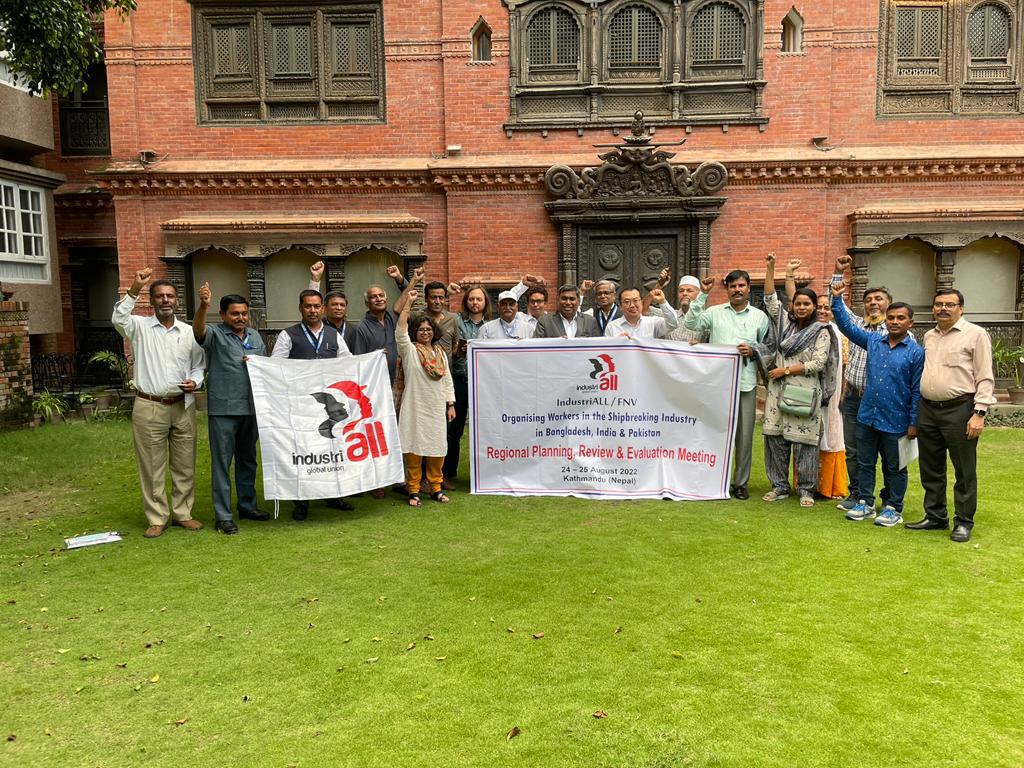Read this article in:
English
25 August, 2022South Asian shipbreaking unions are preparing an organizing drive to take advantage of the expected recycling boom.
Participants at a regional shipbreaking meeting held in Kathmandu, Nepal, on 24 and 25 August, discussed the implications of an expected boom in demand for shipbreaking over the coming decade. The meeting was part of a project, supported by the Dutch trade union confederation FNV, to support organizing campaigns in shipbreaking yards. Shipbreaking is considered one of the most dangerous jobs in the world, and the project seeks to improve conditions by organizing unions.
About 20 participants from five IndustriALL Global Union affiliates participated: ASSRGWA and SEWA from the Alang shipyards and Bhavnagar downstream industry in India, NTUF from the Gadani yards in Pakistan, and BMCGTWF and BMF from Chittagong in Bangladesh.
The shipbreaking industry will undergo dramatic changes in the near future. The Hong Kong Convention for the Safe and Environmentally Sound Recycling of Ships (HKC) is expected to be ratified by Bangladesh next year, a huge step forward to fulfilling requirements for its entry into force.
Shipyards will then have two years to upgrade their facilities to meet HKC standards, involving significant overhauls to the yards. Demand for shipbreaking is expected to grow substantially during this period, due to a number of factors, including a growth in the world commercial fleet. As these ships approach the end of their operational lifespan, the need for recycling will increase. The shift to new fuels and new technologies, as well as legal requirements around carbon emissions, mean that the expected lifespan of a ship is getting shorter.
The growth in demand, combined with the need to meet HKC standards, is expected to create a crunch for the industry, with a lack of capacity to meet demand. This will raise the cost of shipbreaking, and shipyards will need to make significant investments to upgrade their facilities. This is likely to result in attempts to cut corners or find loopholes, and union vigilance will be essential to ensure yards comply with safety and environmental standards.
Meeting participants discussed the safety record of the shipyards, and drafted plans to reduce accidents through an active union presence. They also mapped social security systems in the different countries, including old age, unemployment and illness cover, to identify gaps and make plans to ensure that workers get the best coverage possible.
The unions will focus on increasing density and using collective bargaining to improve conditions.
IndustriALL industry director Walton Pantland said:
“The greening of shipbreaking yards in South Asia is an an opportunity to put Just Transition principles into practice: taking dangerous and dirty jobs, and investing to turn them into safe, green jobs. There is also an opportunity to develop a significant downstream recycling industry. This will only succeed if unions are involved in the implementation process.
“The shipyards of South Asia, and their downstream recycling industry, can provide thousands of quality, green, unionized jobs.”


